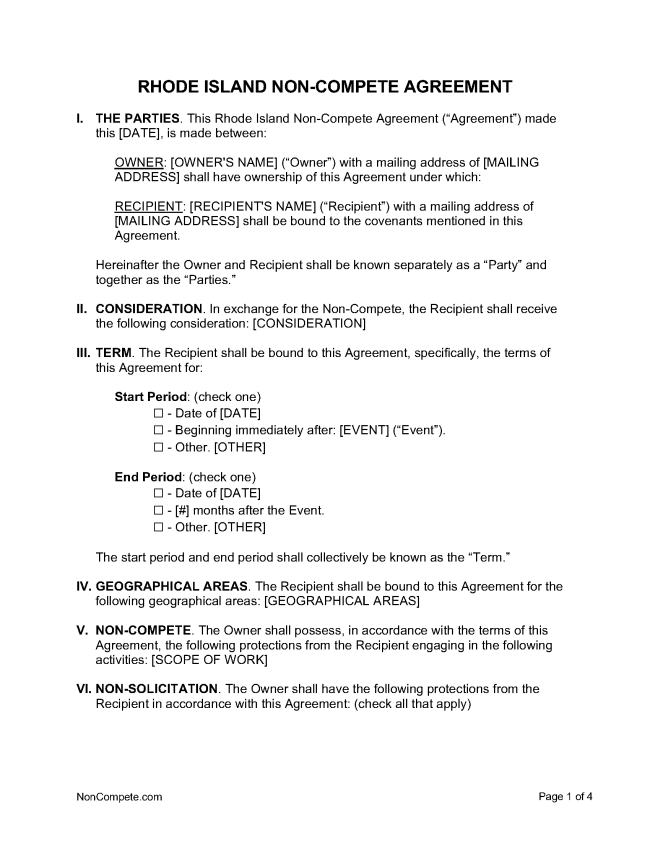A Rhode Island non-compete agreement is a contractual provision that restricts a person’s ability to perform specific work or participate in certain commercial activities. In Rhode Island, non-competes must be part of a more significant transaction, such as an employment relationship, the sale of a business, or a settlement agreement. The scope of a valid non-compete cannot extend beyond what is required to protect competitive interests and cannot place unreasonable burdens on the restricted party.
Table of Contents |
Are Non-Competes Enforceable in Rhode Island?
Non-competes are generally disfavored as contracts in restraint of trade (Durapin, Inc. v. American Products, Inc. (1989)) but may be enforceable if they are:
- Connected with a valid business transaction or relationship
- Necessary to protect legitimate business interests
- Supported by consideration
(Cranston Print Works Company v. Pothier (2004))
Reasonableness
If the party seeking to enforce a non-compete demonstrates that the above prerequisites are met, the court will evaluate whether the terms are reasonable. This is decided based on the individual facts and circumstances of a case.
Reasonableness is dependent on multiple factors, including:
- The nature of the restricted activity
- The timeframe of the agreement
- The geographic limits covered
The competitive interests of most businesses are confined to a specific region, and the necessity of restricting a former employer or business owner’s activity will usually diminish over time as the company adapts. (R.J. Carbone Co. v. Regan (2008))
Protectable Interests
Contractual provisions that merely seek to limit competition would be antithetical to the public’s interest in freedom of trade. Therefore, non-compete agreements must be narrowly designed to protect legitimate business interests. These include:
- Trade secrets and proprietary information (Rhode Island Uniform Trade Secrets Act § 6-41-1(4))
- Confidential customer lists and unique relationships (Durapin, Inc. v. American Products, Inc. (1989))
- Good-will in the sale of a business (Callahan v. Rhode Island Oil Co. (1968))
Minors, Students, Low-Wage and Nonexempt Employees (prohibited)
The Rhode Island Noncompetition Agreement Act (RINAA) prohibits non-compete agreements between an employer and:
- Low-wage employees
- Minors
- Undergraduate and graduate students
- Nonexempt employees as defined by the Fair Labor Standards Act
Attorneys (prohibited)
Attorneys are not allowed to enter contracts that restrict their right to practice. This rule does not apply to agreements involving retirement benefits or the sale of a law firm. (Rule 5.6, Rhode Island Rules of Professional Conduct)
Physicians (prohibited)
Any agreement that seeks to restrict a licensed physician’s right to practice medicine is invalid, except for contractual provisions in the purchase and sale of a medical practice, which are subject to a term limit of five (5) years. (§ 5-37-33)
Burden of Proof
The party seeking to enforce a non-compete agreement has the burden of demonstrating that its terms are reasonable and adequately embedded in a valid contract. (Cranston Print Works Company v. Pothier (2004))
Continued Employment (consideration)
Consideration is required to validate a non-compete agreement, meaning each party must derive a benefit from the existence of the contract. While this benefit can take the form of new value, such as a promotion, special training, or a raise, continued employment also serves as adequate consideration. (Nestle Food Co. v. Miller (1993))
Maximum Term
Outside the rules applied to physicians, there is no maximum term to which Rhode Island non-compete agreements must adhere. The time frame outlined in the agreement must be necessary and reasonable.
For instance, courts found a one-year prohibition on an employee’s right to work for a direct competitor reasonable (Nestle Food Co. v. Miller (1993)), but declined to enforce a five-year restraint on purchasing from an employer’s suppliers (Max Garelick, Inc. v. Leonardo (1969)).
Partial Enforcement
Courts will not throw out an overbroad or partially unreasonable non-compete agreement unless the party seeking to enforce it acts in bad faith. Instead, the agreement will be “blue-lined” and enforced to the extent that it is found reasonable (for employees not covered under the RINAA). (Dial Media, Inc. v. Schiff (1985))
